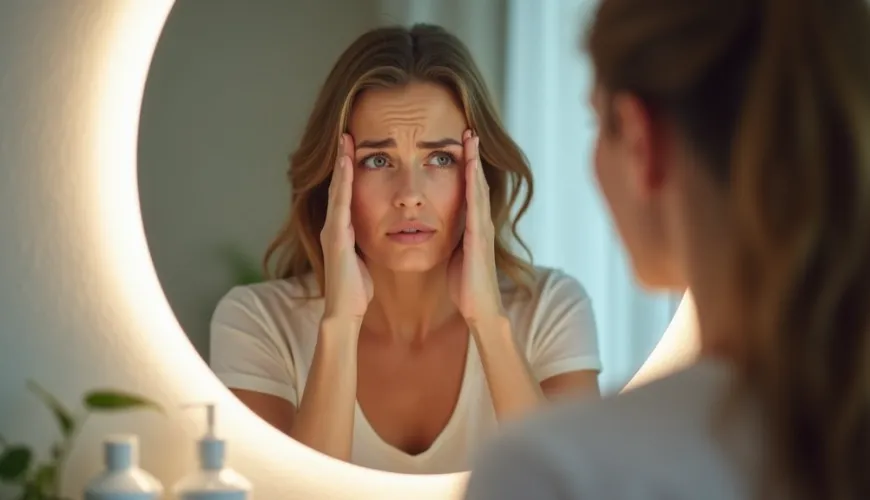
How to Recognize Sudden Vision Deterioration and What to Do Next

When Eyes Stop Cooperating - What Could Be Behind Sudden Vision Deterioration
Vision is one of our most valuable senses. We rely on our eyes daily for work, driving, reading, and communicating with others. Therefore, sudden vision deterioration affecting one or both eyes without warning can cause significant anxiety and uncertainty. Whether it's blurred near vision, loss of sharpness in one eye, or issues in children, it's always essential not to underestimate the symptoms and determine their cause promptly.
People often search for answers online, typing queries like "why can't I suddenly see up close" or "what does sudden vision deterioration in one eye mean." While some causes are harmless and temporary, others may be a warning sign of a more serious health problem.
What Can Cause Sudden Vision Deterioration?
Our eyes are connected to the brain by a complex network of nerves and blood vessels. When any part of this system is disrupted, vision can be immediately affected. Sudden vision deterioration can manifest in various ways—from mild blurring to field of vision gaps to complete vision loss. It can affect just one eye or both simultaneously.
One common example is when a person wakes up in the morning and finds that they can't see clearly up close. While this may be a typical sign of presbyopia (an eye condition associated with aging), if the issues appear suddenly and significantly, it's important to be alert.
In other cases, people notice that one eye is "not working properly"—the image is blurred, dark, or there is a spot in the field of vision. This could be a sign of optic nerve inflammation, a vascular incident, or perhaps retinal detachment. For instance, in a middle-aged patient, a "curtain-like" sensation appeared before the eye—a case of acute retinal detachment requiring immediate surgery. Thanks to timely intervention, part of the vision was saved.
What Are the Most Common Causes of Sudden Vision Deterioration?
Sudden vision issues can stem from physical health, neurology, or even momentary exhaustion. Here's an overview of common causes associated with various forms of vision deterioration:
- Retinal Detachment – Occurs when the retina separates from the underlying tissues, potentially leading to permanent vision damage. It is characterized by flashes, shadows in the field of vision, or a black "curtain" over the eye.
- Optic Neuritis – Often affects only one eye, manifesting as pain during eye movement and progressive blurring or vision loss.
- Ocular Vascular Event – Interruption of blood supply to the retina or visual brain center can cause sudden blindness, often only in one eye.
- Glaucoma (Green Cataract) – In its acute form can cause suddenly worsening eye pain, blurred vision, and halos around lights.
- Migraine with Aura – Before the headache, there may be temporary vision deterioration, flashes, waves, or partial blindness.
- Dry Eyes – Prolonged screen time can lead to corneal dryness and temporary loss of sharpness.
- Diabetes (Diabetic Retinopathy) – Diabetes can damage the blood vessels in the eye, often manifesting as sudden vision deterioration, especially if the disease was not well controlled.
- Medications or Intoxication – Some medications or toxins can affect the optic nerves and cause vision loss.
- Stress and Fatigue – Long-term stress or lack of sleep can cause blurred vision without physical eye damage.
Sudden Vision Deterioration in Children
In children, vision problems are particularly insidious as they often cannot describe them themselves. If a child starts rubbing their eyes, squinting while reading, complains of not seeing the board, or suddenly loses interest in drawing, it's advisable not to delay addressing the problem. Sudden vision deterioration in children can be caused by the onset of myopia, but also by health complications such as inflammation, injury, or developmental eye defects.
Pediatricians and ophthalmologists warn that children's vision develops until the age of six to eight. Any undetected defect can lead to permanent damage, including amblyopia. Therefore, it is recommended to have children's vision checked preventively before starting school and then regularly monitor any changes. If a child starts complaining that the "image disappeared from one eye," it is a reason for an immediate visit to the doctor.
When One Eye Stops Focusing
A special category is sudden vision deterioration in one eye. This could be a sign of so-called amaurosis fugax—a transient blindness caused by a blockage of the artery supplying the eye. This condition lasts from a few seconds to several minutes and is a warning sign that a cerebral vascular incident is imminent.
Another possible cause is optic neuritis, which can appear as the first symptom of multiple sclerosis. A typical sign is a loss of sharpness and fading colors, especially red. The eye may appear entirely normal and not enlarged.
Similarly serious is vitreous clouding or intraocular bleeding, such as in patients with diabetes. Small bleeding may appear as fine "flakes" or blurred vision, while more severe cases lead to complete vision loss.
What to Do When Vision Suddenly Deteriorates?
If there is sudden blurred near vision, especially if accompanied by other symptoms like eye pain, flashes, field of vision gaps, or affecting only one eye, it's necessary to seek medical attention immediately. Time is crucial in these cases. For instance, with retinal detachment, the simple rule applies—the sooner you act, the greater the chance of saving the eye.
For less severe incidents, such as worsened vision after a long workday at the computer, rest, hydration, or eye moisturizing drops may help. However, if problems persist, it's advisable to have your eyes checked by a specialist.
A simple lifestyle change can also help. A healthy diet rich in antioxidants, sufficient sleep, smoking cessation, and regular exercise support eye health. Beta-carotene, lutein, zeaxanthin, and omega-3 fatty acids have a positive effect on the retina and overall vision function. Suitable foods include spinach, carrots, egg yolk, or salmon.
Try our natural products
As ophthalmologist Dr. Václav Tichý says: “Everyone should have a vision check at least once a year—not only for diopters but also for the prevention of more serious diseases."
And what if problems arise in a child during the school year? In such cases, it is first good to talk to the teacher to see if they noticed any changes in behavior or performance. Subsequently, it is advisable to book an appointment with an ophthalmologist or orthoptist. Early diagnosis can save not only grades but also quality of life.
Finally, it is good to realize that vision deterioration is not just a matter of aging. It can affect anyone at any age. And although our eyes sometimes "misbehave" due to fatigue, it's not wise to underestimate even a one-time outage or short-term blurring. We only have one pair of eyes—and vision loss often comes without warning. Therefore, it is better to be one step ahead and give our eyes the same care as our heart or lungs.





